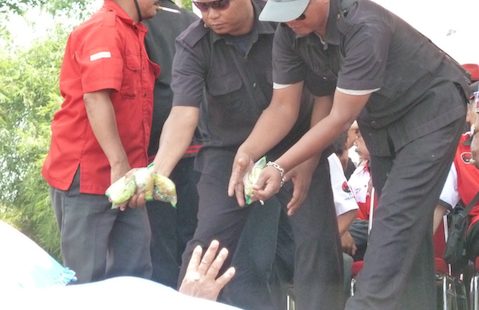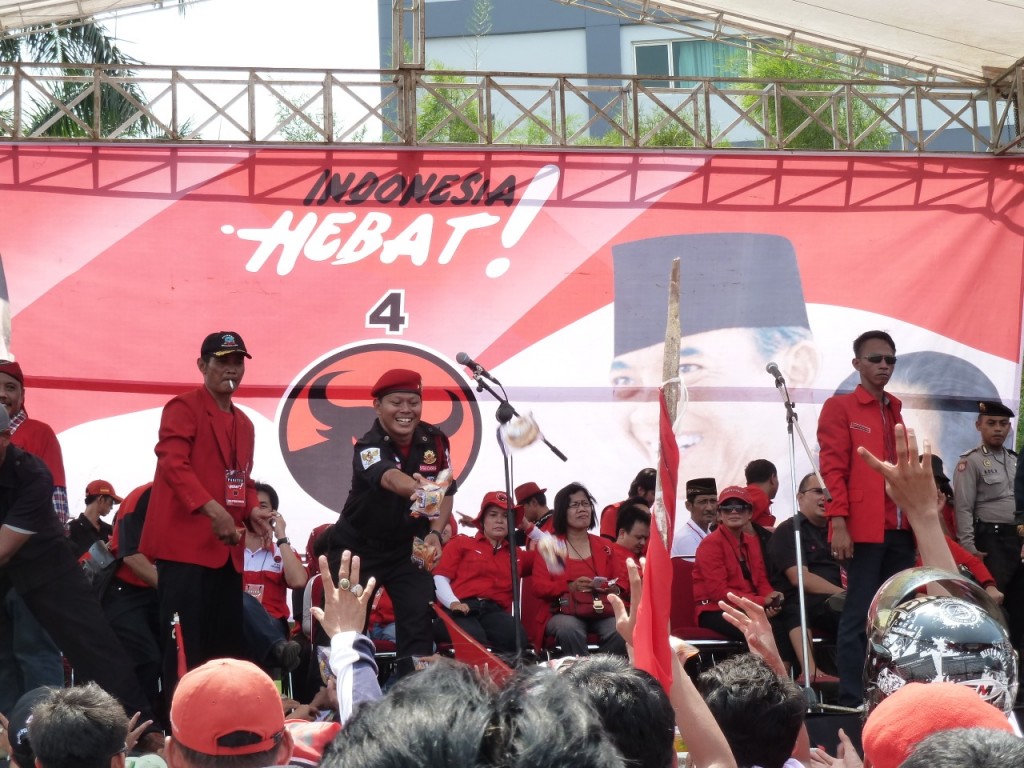
This jpeg went viral this month. It reads “We receive ‘serangan fajar’. There are seven votes here, and six more can be influenced. Note: we don’t want rice.”
“We have to be alert. We have to move around, and spy on the teams of the other candidates.”
It is 1:30, the night before Indonesia’s parliamentary elections, and Andi and I are standing at a street corner in Tangerang, an industrial suburb of Jakarta.
“My candidates don’t do money politics”, he explains as he glances suspiciously at two scooters passing by. “So we have to prevent other candidates from doing so. And if we catch them, we can use that against our competitors”.
We are on the lookout for serangan fajar. This term, meaning ‘dawn attack’, quickly gained currency in the early years of Indonesia’s democratization process to describe the practice of handing out money to prospective voters in the wee hours before the polls open.
That’s when vote buying is most effective, at least in theory: if you are the last one to hand out money, you have a bigger chance that voters will gratefully remember you when standing in the booth.
A car pulls up. It is Toguh, a local priest and head of a Tangerang church association. He’s been cooperating with Andi during this election campaign, and now he apparently also feels some responsibility for this monitoring for serangan fajar.
He tells us that he has seen a suspicious gathering of people just a few blocks down. We quickly get on a motorcycle. It turns out to be false alarm: a group of soccer fans are sitting in front of the television to watch Chelsea playing against Paris Saint Germain.
We drive on. Given the hour, there is quite some traffic on the road.
“They are all tim sukses (campaign team) members”, says Andi as he heads towards a poorer part of the town where, he feels the dawn hand out is most likely.
“They are trying to catch the people who hand out money”. He tells me about this campaign organiser in East Java, who had been caught by the police with 500 million rupiah (45 thousand dollars) in his car.
It’s become more difficult to engage in this form of vote buying. There have been active campaigns against the practice (with the slogan ‘takes his money but do not vote for him’), and both the media and politicians routinely condemn the practice. With many people like Andi on the lookout dawn raids aren’t as easy to execute.
Yet my fieldwork experience in more rural settings suggests that vote-buying is not disappearing.A general disillusionment with politicians, worsened by a constant stream of corruption cases, has generated the impression that money is the only tangible benefit to be gained from politicians.
And the disillusionment is mutual. Many candidates feel that the attitude of voters leaves them with little choice, particularly in poorer areas. While bemoaning the ‘pragmatic attitude’ of voters and the high costs of election, they feel that to forego cash handouts would be a recipe for defeat.
But the practice has been refined. As we tour the sleepy city Andi and I only find more soccer fans supporting Chelsea. “Serangan fajar has become too risky, nowadays it is done at least a week in advance”, comments another campaign organizer with apparent surprise about my nightly effort.
During our night drive, Andi tells tales of the clever ways to avoid detection, such as money stuffed inside packets of instant noodles and soap bars, or ‘vouchers’ to be traded in in secure places. As candidates no longer trust voters to keep their side of the bargain, some of the vote-buying has become ‘post-paid’: some of the money is only handed out after the vote, to voters who can prove their support by taking a photo in the booth or by tearing out a piece of paper of the ballot.
The recurring element of all these different strategies is the need for operators who can be trusted to distribute the money effectively. Andi himself is a facilitator of a refined type of vote buying. In the run-up to the elections, he has made deals with a number of candidates on behalf of Toguh’s church association.
As Andi (himself a Muslim) advertises his offer: “When a priest says something, people will listen to him. Each congregation has many people, so you can calculate how much votes I can deliver.” This sales pitch must have worked, because four candidates have agreed to Andi’s ‘proposal’.
Toguh explained how he organised private meetings with members of their congregation to convey their voting advice. In return for these meetings, candidates paid Toguh’s organisation 30 million rupiah (2800 dollar) per district. Andi protests loudly when I called this vote buying.
He prefers to use the term ‘operational money’, and emphasizes that the money is needed to organize the meetings. There is a large gray area between outright vote buying and supporting an organization to generate goodwill.
When a call Andi a day after the elections, Andi is in a good mood. All his four candidates have won their seats. And Chelsea has won too.
Ward Berenschot is a researcher with the KITLV, University of Leiden researching money politics in Indonesia.
 Facebook
Facebook  Twitter
Twitter  Soundcloud
Soundcloud  Youtube
Youtube  Rss
Rss 
